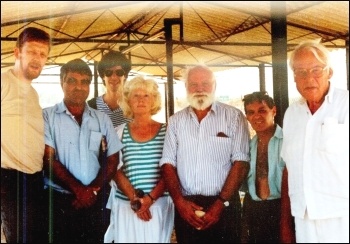Birmingham Six: 25th anniversary of release
As the 25th anniversary – on 14 March – of the release of the Birmingham Six approaches, Dave Nellist, former Coventry Labour MP, remembers their arrest and the campaign for their release.
On the night of Thursday, 21st November 1974, two IRA bombs exploded in central Birmingham pubs, destroying the Mulberry Bush and the Tavern in the Town, killing 21 people and injuring over 160. Many of the victims were themselves Irish.
Alongside the overwhelming sense of revulsion at the death and injury of ordinary working class people, the bombings triggered a wave of anti-Irish sentiment, particularly in the West Midlands. Petrol bombs were thrown at the Irish community centre in Digbeth, at an Irish pub in Kingstanding, and at Irish businesses and schools.
Workers walked out of the Leyland plant in Longbridge carrying placards demanding the hanging of the bombers. Support from small, fringe, allegedly Marxist groups in Britain for the right of the IRA to conduct an ‘armed struggle’ affected factory sales of genuine Marxist papers like the Militant.
Militant was in favour of workers’ unity in Northern Ireland, a struggle for a socialist Ireland with full rights for all minorities, and a socialist federation on an equal and voluntary basis of Ireland with England, Scotland and Wales.
Militant resolutely opposed the IRA’s campaign of individual terrorism which further divided working class people.
Six men from Birmingham who, before the bombs had exploded, had been travelling to Belfast, were arrested and beaten by West Midlands police during three days of lengthy periods of interrogation, which also involved food and sleep deprivation. Four of the men ‘confessed’. 14 prison officers charged with assault arising from the case were later all acquitted.
Scientific tests showed that statements the Six had made during their questioning had been altered at a later date. Forensic evidence ‘proving’ that two of the six had been handling explosives was challenged by an expert for the defence (the former Chief Inspector of Explosives for the Home Office) and later discredited.
16 years in jail
The Birmingham Six: Paddy Hill, Hugh Callaghan, Richard McIlkenny, Gerry Hunter, Billy Power and Johnny Walker, served 16 years in high security jails for that false accusation and wrong conviction.
Much of the investigative work in the 1980s which demolished the forensic evidence and alleged confessions was done for Granada TVs ‘World in Action’ by Chris Mullin (later to become a Labour government minister) and published in his book ‘Error of Judgement’.
At the Court of Appeal in 1991 new evidence was heard of police fabrication and suppression of evidence which, together with the discrediting of the forced confessions and the tainted forensic evidence, was so strong that the prosecution service decided not to oppose the appeal. Three police officers, including a superintendent, were later charged with perjury and conspiracy to pervert the course of justice, but were never actually prosecuted.
The release of the Birmingham Six on 14 March 1991 was among a number of others around that time who had been convicted of terrorist offences in the 1970s, including the Guildford Four, and Judith Ward who had served 19 years of a 30-year sentence for the M62 coach bombing. The cases were joined by other miscarriages, including in the next six years 27 people having convictions quashed or charges dropped after evidence from West Midlands detectives was discredited.
Several of the Birmingham Six have continued campaigning, not only on their own behalf, but also for others.
Paddy Hill, less than five months after his release in 1991, accompanied me to Israel/Palestine as part of a week-long international delegation to attend the appeal of Mahmoud Masarwa, a Palestinian trade unionist wrongly convicted by Israeli courts of terrorism. A year later Paddy Hill was the main speaker at my election rally in the 1992 general election.
More recently Paddy has campaigned alongside ‘Justice4the21’ – the group set up by family and relatives of those who died in the 1974 Birmingham pub bombings – and supported their petition for a new inquiry.
The Birmingham Six were political scapegoats. They were beaten and tortured until four of them ‘confessed’. For 16 ½ years millions of pounds of public money was used to sustain those wrongful convictions, and no one from the police or legal system was ever successfully prosecuted for the fraud and perjury that convicted them.
Wider accountability of the police and democratic control over them have yet to be achieved, as developing revelations about undercover policing and many other issues still show.
This version of this article was first posted on the Socialist Party website on 10 March 2016 and may vary slightly from the version subsequently printed in The Socialist.









